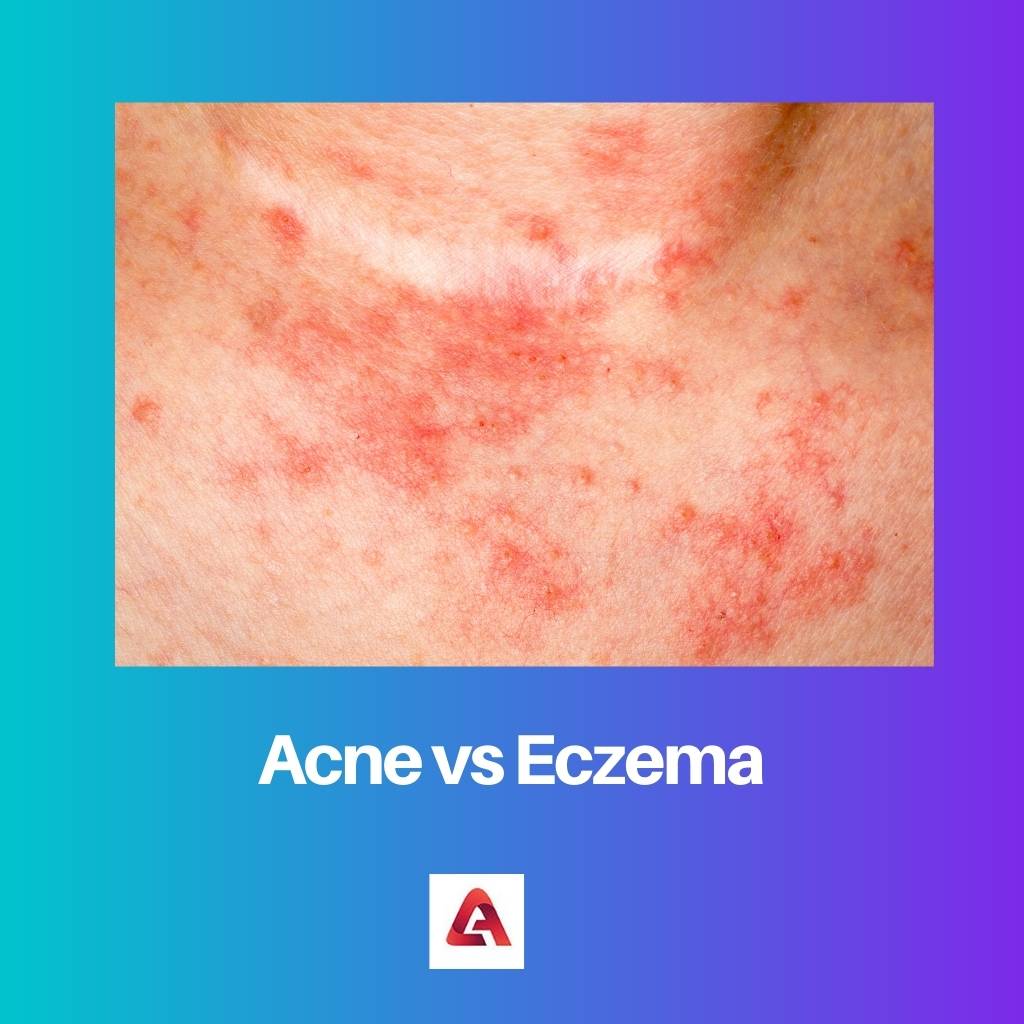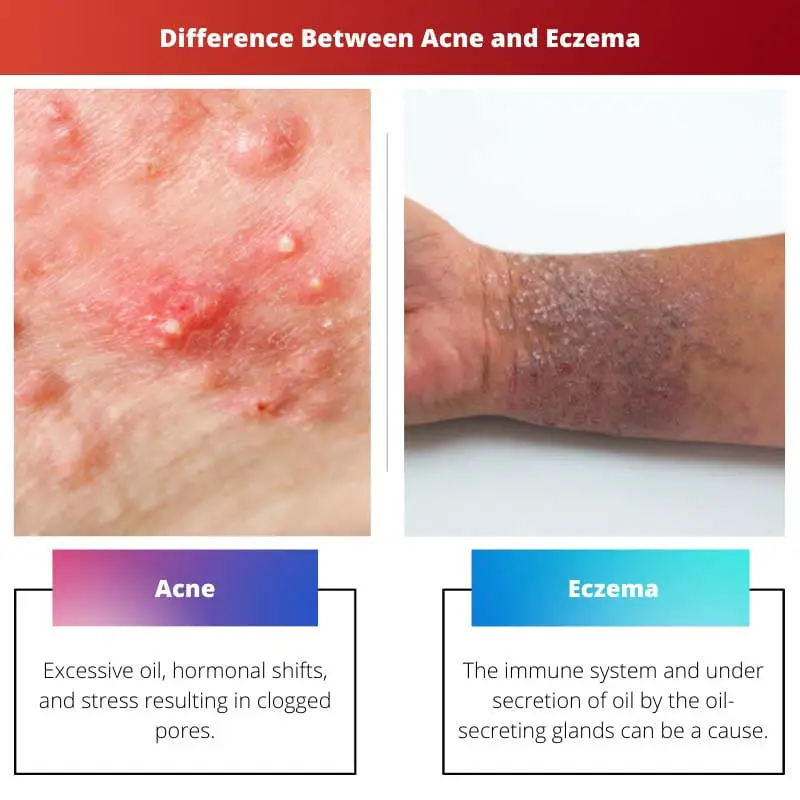The skin is the most exposed organ of our body and, thus, is prone to innumerable infections and problems. But very often, we neglect such diseases and brush them aside until they start bothering us.
Let’s face it, skin issues such as redness, inflammation, and itchiness can be very embarrassing and are indicators that our skin is infected and needs immediate medical care.
Acne and Eczema are two such skin conditions that may appear very similar to a layman. Because both cause redness and inflammation of the skin, it’s best if we consult a skin specialist or a dermatologist about it.
Key Takeaways
- Acne is a skin condition characterized by the formation of pimples and blackheads, while eczema is a skin condition characterized by inflammation, redness, and itching.
- Clogged pores and excess oil production cause acne, while eczema is caused by an overactive immune system or a reaction to irritants.
- Acne is more common in teenagers, while eczema can occur in people of all ages.
Acne vs Eczema
Acne does not cause itching, while Eczema does. Acne occurs in teens, while Eczema can happen to people of any age. Acne is a skin condition that causes bumps to form on the skin, while eczema is a skin condition that causes dry, flaky skin along with redness and itching.

Acne appears on our skin when the pores are clogged. It is due to excess secretion of sebum(oil), pollutants, dirt, dead skin cells, and also sometimes due to acne-causing bacteria.
As a result of these clogged pores, blackheads, pimples, and whiteheads appear on the skin, and these breakouts mostly appear on our face, neck, back, and shoulder.
People with oily skin are the ones most likely to develop acne. Acne also causes severe psychological distress, such as low self-esteem and confidence, embarrassment, and anxiety.
Eczema is an autoimmune disease(a disease caused when one’s immune system attacks its body cells). Eczema-affected people have dehydrated skin. Inflamed, itchy, dry and crusty, and red skin are some of the symptoms of Eczema.
Comparison Table
| Parameters of Comparison | Acne | Eczema |
|---|---|---|
| Causes | Excessive oil, hormonal shifts, and stress resulting in clogged pores | The immune system and under secretion of oil by the oil-secreting glands can be a cause |
| Symptoms | Oily skin, pus-filled pimples, nodules | Dry and flaky skin, itching |
| Types | Blackheads, whiteheads, nodules, zit, papules, pustules, cysts | Atopic dermatitis, Neurodermatitis, Seborrheic dermatitis, stasis dermatitis |
| Hormones | Hormones and their imbalance largely cause acne | Hormones do not cause Eczema |
| Treatment | Systemic therapy and topical treatment like salicylic acid, benzoyl peroxide, niacinamide. | Steroids and antihistamine |
What is Acne?
Imagine waking up one morning, all fresh and ready to start the day, only to find out that you have a bump on your face. It’s all red and stingy, and all of a sudden, your mood becomes irritable and distressed.
Yes, that’s the extent to which acne can affect a person! Acne can appear on our face, neck, back, and shoulder as blackheads, whiteheads, zits, pus-filled pimples, and nodules.
Multiple factors can cause these uninvited guests. Some are due to clogged pores due to excessive oil secretion by sebaceous glands, stress, hormonal imbalance, pollution and humidity, medications, and sometimes even hygienic issues.
When our oil glands secrete excessive oil or sebum, it attracts acne-producing bacteria because they feed on these oils, and then acne appears on our skin.
When we are under lots of stress and tension, It secrets the hormone cortisol(stress hormone), which causes inflammation, and our skin flares up, and acne appears.
One’s diet and lifestyle are also responsible for the appearance of acne. Who follow a healthy lifestyle and drink lots of water. Those who get adequate sleep, exercise, and consume healthy food are less likely to develop acne.
But the people who have a sedentary lifestyle drink lots of caffeine and eat a lot of junk food.
Acne is incurable but can be reduced and prevented. It’s best to consult a dermatologist if you have acne rather than applying layers of concealing makeup products.
Dermatologists offer Topical and Systemic therapy to reduce acne. In topical therapy, the direct application of the medication is necessary for the skin.
Gels and lotions contain chemicals like Benzoyl Peroxide, resorcinol, salicylic acid, and niacinamide. You need to take the medication by mouth in Systematic therapy.
Antibiotics like tetracycline, minocycline, doxycycline, or erythromycin reduce inflammation. Women with hormonal issues need to take oral contraceptives. You can take vitamins in the form of Isotretinoin in cases of very severe acne.

What is Eczema?
Our immune cells are constantly trying to fight off an underlying health issue or a disease, and during this, sometimes our immune system reacts in such a way that it starts attacking our healthy cells.
It causes autoimmune diseases, and Eczema is one such autoimmune disease. A sensitive immune system, genes, and underlying health issues like asthma might be some of the causes of Eczema.
These causes do not let the sebaceous glands produce oil and the skin to hold moisture. The skin becomes very dry, flaky, and irritated, which manifests in skin redness, swelling, itchy patches, and pus.
Triggers of allergens can also cause eczemas. Not all cases of Eczema look the same, but they are different from each other with several symptoms and causes.
It can appear on hands, legs, arms, faces, and the middle portion of the body. Eczema is scientifically known as atopic dermatitis, where atopic refers to conditions involving the immune system, and dermatitis refers to inflammation.
There is no permanent cure for this skin disease. The skin becomes excessively dry and flaky due to Eczema. Doctors recommend applying thick layers of lotions and moisturizers to hydrate the skin.
Doctors recommend wearing lightweight fabric. You can use cotton and use a very mild or medicated soap when one has Eczema. We need to take extra care during winter so that the excessive dryness of the weather doesn’t further dry the skin up.

Main Differences Between Acne and Eczema
- Acne is caused by stress, hormonal imbalances, excessive oil secretion, PCOS(in women), lack of sleep, and poor and unhealthy lifestyles, whereas eczemas are autoimmune diseases and specific allergens.
- It is genetic as well. Blackheads, Whiteheads, pustules, nodules, and zits are different types of acne, whereas stasis dermatitis, nummular dermatitis, contact dermatitis, neurodermatitis, and Dyshidrotic eczemas are the different types of Eczema.
- The skin is greasy and oily if a person has acne, whereas, in eczemas, the skin is dry, flaky, and patchy.
- Hormones and their imbalances play a huge role in the formation of acne, whereas Eczema is not affected due to hormonal changes.
- Treatments for Acne include Topical therapy and systemic therapy, whereas treatments for Eczema include steroids, antihistamines, and even phototherapy.


The post’s content underlines the importance of acknowledging skin issues and seeking a professional’s advice. It does a great job explaining the differences between acne and eczema, providing valuable information for readers with different skin problems.
Agreed, the comparison table is definitely informative and the detailed explanation of causes and symptoms makes the content more comprehensive.
It’s crucial to understand these conditions so that appropriate treatment can be applied. The article does a good job in highlighting the significant aspects of acne and eczema.
The article effectively explains the causes, symptoms, and treatments of acne and eczema. It’s enlightening and ensures that readers have a better understanding of these skin issues.
The content is well-structured and gives an insightful comparison between acne and eczema. It will undoubtedly help individuals identify their skin problems for proper medical intervention.
This article is a valuable resource for understanding the differences between acne and eczema, providing readers with detailed information on the causes, symptoms, and treatments of these skin conditions.
The article sheds light on the distinct characteristics of acne and eczema, making it easier for individuals to identify their skin problems. It’s educational and informative, encouraging people to seek professional help.
I appreciate the insights provided in this article, as it’s crucial for individuals to differentiate between common skin conditions. Understanding the causes and symptoms is important for effective treatment.
The detailed comparison table is especially helpful in understanding the contrasting features of acne and eczema. It provides a comprehensive overview of both conditions.
The detailed analysis of acne and eczema’s causes, symptoms, and treatments enables readers to identify their specific skin problems. It’s an informative piece, emphasizing the importance of seeking early medical intervention.
This article serves as an educational tool for individuals dealing with acne and eczema. It effectively communicates the contrasting features of these skin conditions, encouraging proactive healthcare measures.
The in-depth comparison of acne and eczema is educational, providing readers with valuable insights into these skin conditions. It effectively emphasizes the need for professional medical intervention for skin health.
This article’s detailed analysis of acne and eczema offers in-depth knowledge about the contrasting symptoms and treatments for these skin conditions. It’s an educational resource promoting better skin health.
The article delivers a comprehensive overview of acne and eczema, guiding individuals to understand their skin conditions. It encourages a proactive approach to seek medical advice for effective treatment.
The article’s breakdown of acne and eczema is enlightening, helping individuals understand their skin conditions and seek appropriate medical assistance. It’s a valuable resource for promoting better skin health.
The detailed comparison between acne and eczema offers a more profound understanding of these skin conditions. It emphasizes the significance of professional treatment for skin problems.
This article provides an insightful comparison of acne and eczema, guiding readers in distinguishing between these skin issues for adequate care. It serves as a comprehensive resource for skin health awareness.
The content provides a clear distinction between acne and eczema, which is essential for those dealing with these skin problems. It also emphasizes the importance of consulting a dermatologist for proper medical care.
The detailed explanation of acne and eczema is very beneficial for readers. It provides valuable insights into these skin conditions for those looking for the right treatment.
The section comparing acne and eczema clearly outlines the different causes, symptoms, and treatments for each condition. This in-depth analysis helps readers gain a better understanding.
The post serves as a comprehensive guide for understanding acne and eczema, helping individuals recognize the symptoms and seek professional help. It enhances awareness about skin health effectively.
The article provides valuable insights into acne and eczema, ensuring readers are well-informed about these skin conditions. It emphasizes the necessity of seeking professional advice for effective treatment.
The content portrays a detailed comparison of acne and eczema, enabling readers to identify their skin problems. It’s an informative piece emphasizing the significance of informed medical care for skin health.
The detailed information presented in this article helps individuals understand the differences between acne and eczema. Its educational content encourages proper medical diagnosis and treatment.
This article effectively communicates the distinguishing factors of acne and eczema, ensuring readers can address their specific skin issues proactively. It’s a valuable resource for healthcare awareness.
The content is informative and educational, especially in explaining the distinct characteristics of acne and eczema. It serves as an essential guide for individuals experiencing skin problems.
This article makes it easier for readers to grasp the key differences between acne and eczema. Its informative content encourages a proactive approach to addressing skin problems.
The detailed discussion on acne and eczema contributes to creating awareness about these skin issues. It portrays the importance of proper diagnosis and treatment for a healthier skin condition.